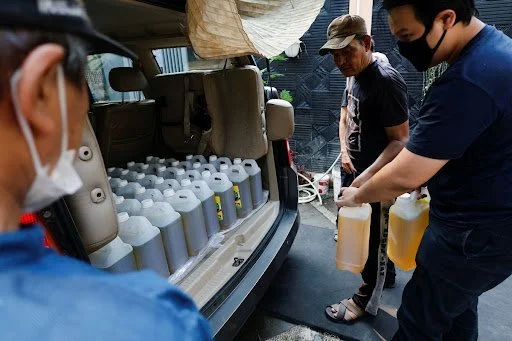Indonesia Bans Palm Oil Exports as World Faces Food Insecurity Crisis
Cooking oil is rationed to locals at a filling station in Jakarta, Indonesia, March 10, 2022. Photo: Willy Kurniawan/Reuters
On Friday, Indonesia announced an export ban on palm oil to combat spiking global food prices. In a letter sent to government leaders Monday, the nation’s agriculture ministry clarified that the ban would exclude crude palm oil, but include refined, bleached and deodorized palm olein. Indonesia is the largest exporter of palm oil, but has nevertheless faced rising domestic palm oil prices.
Globally, the prices of the four major edible oils--palm, sunflower, rapeseed, and soybean--have risen dramatically due to poor growing seasons and geopolitical pressures. The palm oil ban, which goes into effect Thursday, may worsen the escalating global food insecurity crisis.
“I will continue to monitor and evaluate the implementation of this policy so that the availability of cooking oil in the country is abundant and at an affordable price,” Indonesian President Joko Widodo said in a statement.
Palm oil is used for cooking and in a wide range of consumer products, including cosmetics and soap products. It is the most produced and consumed edible oil, accounting for 40 percent of all oil trade. Indonesia represents 60 percent of the palm oil market, and the majority of its exports are processed oils.
Indonesia’s attempt to insulate itself from the global food insecurity crisis will only exacerbate the global crisis. The 2020-2021 harvest of all four major edible oils was lower than usual, and this year’s harvest is uncertain. The Black Sea accounts for over 76 percent of all sunflower oil trade, with Ukraine alone accounting for around 46 percent. Soybean oil and rapeseed oil harvests also faced drought and poor growing seasons in 2021. In addition, the second-largest producer of palm oil, Malaysia, faced labor shortages and a corresponding decline in production in 2021 due to coronavirus travel restrictions.
Like many nations, Indonesia is experiencing a sharp increase in domestic food prices. Cooking oil prices have risen by 40 percent this year in Indonesia, despite previous measures to combat inflation. In January, Indonesia enacted the Domestic Market Obligation, requiring companies to set aside 20 percent of planned palm oil exports for the domestic market. In March, the government increased the required amount to 30 percent. Trade Minister Muhammad Lutfi said the measure would “ensure that all parts of the domestic cooking oil industry can function properly.”
The government in Jakarta recently announced a probe into major palm oil producers for collusion over high prices and attempting to bypass the export limits of the Domestic Market Obligation. The three companies named in this corruption probe, Permata Hijau Group, PT Wilmar Nabati Indonesia, and Musim Mas, all denied the allegations that they colluded to ignore the export ban on palm oil.
Widodo announced the ban on palm oil exports after protesters in Jakarta rallied against rumors that the government is postponing the 2024 presidential election and demanded economic relief from rising food prices. The protestors read out their demands for reducing the cost of food products, such as cooking oils, in front of the Presidential Palace.
“We will keep fighting and the wave of demonstrations will continue if the government doesn’t listen to our demands,” said one protester.


